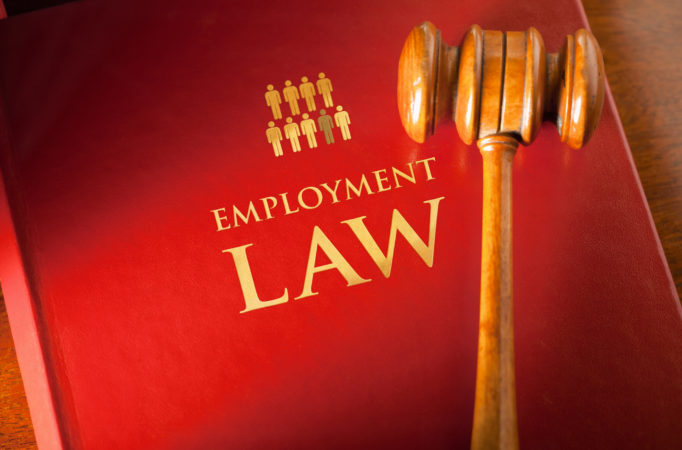Employment & Labor Law
CDC Coronavirus Workplace Update & Potential Legislative Action
The CDC recently issued coronavirus guidance for office building workplaces. In short summary, it continues and updates CDC employer guidance, calling for wearing masks in all areas, maintaining social distancing, good air ventilation and filtration with increased circulation of outside air, temperature and symptom checks at the start of the workday, lessening employee use of public transit, and other measures. A copy of the CDC guidance on office workplaces is available at https://www.cdc.gov/coronavirus/2019-ncov/community/office-buildings.html, and the related policy for workplaces in general is available at https://www.cdc.gov/coronavirus/2019-ncov/community/guidance-business-response.html.
Earlier this month, the undersigned attorneys of our firm prepared and issued a sample workplace coronavirus policy to help our clients manage resuming or continuing workplace activities. See our article and included policy here. The current above CDC guidelines, as applicable, should be part of your policy.
The CDC guidelines, while not mandatory, in some respects go beyond the Pennsylvania Department of Health’s workplace mandatory Order. Pennsylvania requires employers to do temperature checks of employees for at least two weeks following the known presence of a COVID-19 positive or presumed positive employee or other person in the workplace (see our article on this workplace Order here). The CDC guidelines call for temperature and symptom checks at the start of each workday regardless whether there has been anyone in the workplace known or presumed to have COVID-19. Our sample workplace policy included the option of temperature checks as a matter of daily routine regardless of the known presence of a COVID-19 infected person in the workplace. While the temperature checks can be done at the workplace, we included another option of having employees take their own temperature at home before leaving for work and report it to their employer (along with periodic sample temperature checking at work to promote employee compliance), as a means of lessening the exposure risk to the temperature taker. This is permitted by the Pa. Dept. of Health, as described in our prior article (see link in the second paragraph here), and seems to also be approved by the CDC which calls for “daily in-person or virtual health checks (symptoms and/or temperature screening) of employees before they enter the work site. While this CDC wording mentions temperature screening as an optional part of symptom screening, we believe it increasingly likely that juries will regard temperature checks as part of a responsible employer practice, as an elevated temperature is one of the primary (but not always present) symptoms of COVID-19 and is part of the CDC recommendations.
Employers as well as employees should reassess what changes to make. In addition to continuing remote work from home arrangements where productive, this may include adding temperature checks, assisting employees with parking and/or staggering work start and end times to make them feel more comfortable about getting to work, along with physical modifications to the workplace such as separating workspaces, increased shielding, opening windows and increasing air circulation as well as filtration. Employers renting their office or other workspace should confirm their landlord’s policies regarding common areas (including elevators), enhanced cleaning, etc. Employees should continually reassess their procedures/habits to minimize not only the risk of their own infection with the coronavirus but also of being a carrier without symptoms (or only mild symptoms) who infect coworkers who then unknowingly infect family members or others, including those at high risk of serious consequences.
The coronavirus has made operating much more costly for businesses and other organizations, while causing many patrons to cut back on their spending in some areas. The U.S. House of Representatives yesterday (May 28, 2020) passed a bill to revise the Paycheck Protection Program loan terms to relax requirements for employer forgiveness, such as extending from eight to up to twenty-four weeks the time for employers to achieve loan forgiveness based on employee pay and other expenditures, pushing back a June 30 deadline for loan recipients to end layoffs in order to qualify for full forgiveness, and reducing the percentage of the loan money that must be spent on payroll (from 75% to 60%). The Senate has approved a different version (e.g., with a shorter extension of the time to qualify for forgiveness), so stay tuned to know how to manage your way through the coronavirus challenges.
The lawyers of Houston Harbaugh, including the following employment law attorneys who authored this article, are interested in and stand ready to help you take advantage of available opportunities and to avoid the big liability risks and business losses created by this pandemic.
Please feel welcome to contact Craig M. Brooks and Catherine S. Loeffler with any questions.
About Us
Claims and suits brought against employers by employees are a large part of the cases being handled by the Employment lawyers at Houston Harbaugh. We focus on assisting and counseling our clients to be positioned to avoid claims, and if the claims are brought, to be prepared to defend against them.

Craig M. Brooks - Practice Chair
An employment and labor attorney, Craig primarily represents management, providing advice on how to handle employee issues and actions, as well as defending or pursuing claims in court and before government agencies on matters.
An employment and labor attorney, Craig primarily represents management, providing advice on how to handle employee issues and actions, as well as defending or pursuing claims in court and before government agencies on matters including:
- Employment discrimination claims
- Wage and hour matters
- Sexual and other harassment investigations and claims
- Family and Medical Leave Act
- Wrongful discharge
- Labor/Union matters
- Restrictive covenants
- Affirmative action programs
- Defamation
- Privacy
Craig also represents individuals with advice and pursuing claims arising out of their employment.

